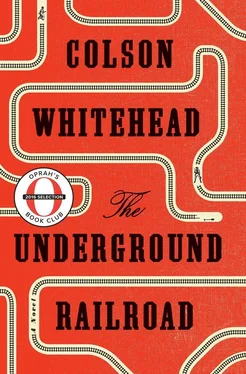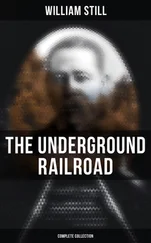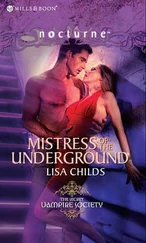The noon whistle had just sounded. Ethel was out. Fortunately, another girl from Irishtown visited after lunch and the two gossiped in the parlor for so long that afterward Fiona had to speed through her chores. She either didn’t notice the odor or pretended not to, shirking the responsibility for cleaning after whatever rodent’s nest was up there. When Martin came that night and they cleaned, he told Cora it was best if he didn’t mention the close call to Ethel. Her nerves were especially brittle with the rise in the humidity.
Informing Ethel was up to Martin. Cora hadn’t seen the woman since the night of her arrival. As far as she could tell, her host didn’t speak of her — even when Fiona was off the premises — beyond infrequent mentions of that creature . The slam of the bedroom door often preceded Martin’s upstairs visit. The only thing that kept Ethel from turning her in, Cora decided, was complicity.
“Ethel is a simple woman,” Martin said, sinking in the chair. “She couldn’t foresee these troubles when I asked for her hand.”
Cora knew that Martin was about to recount his accidental recruitment, which meant extra time outside the nook. She stretched her arms and encouraged him. “How could you, Martin.”
“Lord, how could I,” Martin said.
He was a most unlikely instrument of abolition. In Martin’s recollection, his father, Donald, had never expressed an opinion about the peculiar institution, although their family was rare in their circle in not owning slaves. When Martin was little, the stock boy at the feed store was a wizened, stooped man named Jericho, freed many years previously. To his mother’s dismay, Jericho came over every Thanksgiving bearing a tin of turnip mash. Donald grunted in disapproval or shook his head at newspaper items about the latest slave incident, but it wasn’t clear if he judged the brutality of the master or the intransigence of the slave.
At eighteen, Martin left North Carolina and after a period of lonesome meandering took a position as a clerk in a Norfolk shipping office. The quiet work and sea air suited him. He developed a fondness for oysters and his constitution improved generally. Ethel’s face appeared one day in a crowd, luminous. The Delanys had old ties to the region, pruning the family tree into a lopsided sight: abundant and many-cousined in the north, sparse and faceless in the south. Martin rarely visited his father. When Donald fell while fixing the roof, Martin hadn’t been home in five years.
The men had never communicated easily. Before Martin’s mother passed, it was her lot to translate the ellipses and muttered asides that constituted conversation between father and son. At Donald’s deathbed, there was no interpreter. He made Martin promise to finish his work, and the son assumed the old man meant him to take over the feed store. That was the first misunderstanding. The second was taking the map he discovered in his father’s papers for directions to a cache of gold. In his life, Donald wrapped himself in a kind of quiet that, depending on the observer, signaled imbecility or a reservoir of mystery. It would be just like his father, Martin thought, to comport himself like a pauper while hiding a fortune.
The treasure, of course, was the underground railroad. Some might call freedom the dearest currency of all, but it was not what Martin expected. Donald’s diary — set on a barrel on the station platform and surrounded by colored stones in a kind of shrine — described how his father had always been disgusted by his country’s treatment of the Ethiopian tribe. Chattel slavery was an affront to God, and slavers an aspect of Satan. Donald had provided aid to slaves his whole life, whenever possible and with whatever means at hand, ever since he was a small boy and misdirected some bounty men who badgered him over a runaway.
His many work trips during Martin’s childhood were in fact abolitionist missions. Midnight meetings, riverbank chicanery, intrigue at the crossroads. It was ironic that given his communication difficulties, Donald functioned as a human telegraph, relaying messages up and down the coast. The U.G.R.R. (as he referred to it in his notes) operated no spurs or stops in North Carolina until Donald made it his mission. Working this far south was suicide, everyone said. He added the nook to the attic nonetheless, and if the false ceiling was not without seams, it kept his charges aloft. By the time a loose shingle undid him, Donald had conveyed a dozen souls to the Free States.
Martin helped a considerably smaller number. Both he and Cora decided his skittish personality had not helped them during the close call the previous night, when in another bad omen the regulators knocked on the front door.
—
IT had been just after dark and the park was full of those afraid to go home. Cora wondered what waited for them that they lingered so purposefully, the same people week after week. The fast-walking man who sat on the fountain’s rim, dragging his fingers through his wispy hair. The slovenly, wide-hipped lady who always wore a black bonnet and muttered to herself. They weren’t here to drink the night air or sneak a kiss. These people slumped on their distracted circuits, looking this way and that, never in front. As if to avoid the eyes of all the ghosts, the dead ones who had built their town. Colored labor had erected every house on the park, laid the stones in the fountain and the paving of the walkways. Hammered the stage where the night riders performed their grotesque pageants and the wheeled platform that delivered the doomed men and women to the air. The only thing colored folks hadn’t built was the tree. God had made that, for the town to bend to evil ends.
No wonder the whites wandered the park in the growing darkness, Cora thought, her forehead pressed into the wood. They were ghosts themselves, caught between two worlds: the reality of their crimes, and the hereafter denied them for those crimes.
Cora was informed of the night riders’ rounds by the ripple passing through the park. The evening crowd turned to gawk at a house on the opposite side. A young girl in pigtails let a trio of regulators inside her home. Cora remembered the girl’s father had trouble with their porch steps. She hadn’t seen him for weeks. The girl clutched her robe to her neck and closed the door behind them. Two night riders, tall and densely proportioned, idled on the porch smoking their pipes with complacent sloth.
The door opened half an hour later and the team huddled on the sidewalk in a lantern’s circle, consulting a ledger. They crossed the park, eventually stepping beyond the spy hole’s domain. Cora had closed her eyes when their loud rapping on the front door shocked her. They stood directly beneath.
The next minutes moved with appalling slowness. Cora huddled in a corner, making herself small behind the final rafter. Sounds furnished details of the action below. Ethel greeted the night riders warmly; anyone who knew her would be certain she was hiding something. Martin made a quick tour of the attic to make sure nothing was amiss, and then joined everyone downstairs.
Martin and Ethel answered their questions quickly as they showed the group around. It was just the two of them. Their daughter lived elsewhere. (The night riders searched the kitchen and parlor.) The maid Fiona had a key but no one else had access to the house. (Up the stairs.) They had been visited by no strangers, heard no strange noises, noted nothing out of the ordinary. (They searched the two bedrooms.) Nothing was missing. There was no cellar — surely they knew by now that the park houses did not have cellars. Martin had been in the attic that very afternoon and noticed nothing amiss.
“Do you mind if we go up?” The voice was gruff and low. Cora assigned it to the shorter night rider, the one with the beard.
Читать дальше












